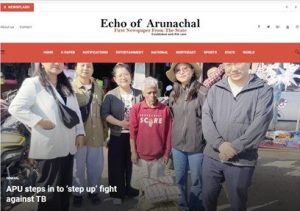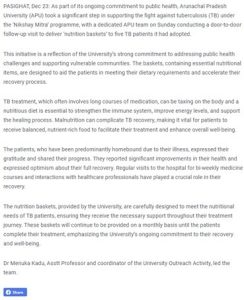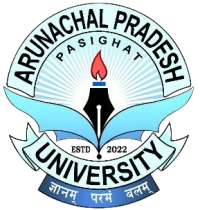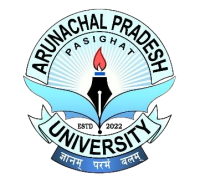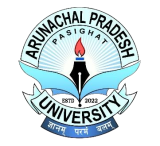Outreach Cell
12/24/2024 2025-03-01 13:58Outreach Cell
The Outreach Cell at Arunachal Pradesh University, Pasighat, serves as a bridge between the university and the broader community, fostering meaningful engagement through social responsibility initiatives and collaborative efforts. The cell is dedicated to organizing community outreach programs, creating opportunities for students and faculty to participate in service-oriented activities, and building partnerships with external organizations to address local and regional challenges.
Under the leadership of a Coordinator, the Outreach Cell works to expand the university’s role in promoting social awareness, supporting community development, and providing a platform for students to apply their learning in real-world contexts. The cell’s activities range from volunteer work and awareness campaigns to partnerships with NGOs, government agencies, and businesses, aiming to contribute to the social, economic, and cultural betterment of the surrounding communities. Through these efforts, the Outreach Cell ensures that the university’s commitment to societal impact extends beyond academic boundaries, enriching both the institution and the community it serves.
Objectives
- To foster active participation among students, faculty, and staff in community service initiatives, thereby cultivating a culture of social responsibility and community engagement.
- To develop and sustain collaborative relationships with local, national, and international organizations, facilitating joint projects, internships, and career advancement opportunities for students and other stakeholders.
- To extend the university’s educational expertise to underprivileged populations through targeted programmes such as workshops, mentoring, and academic support to promote equitable access to knowledge.
Functions
- To promote awareness of the university’s resources and opportunities within the larger community.
- To develop programmes that address and improve the educational and social conditions of underserved populations.
- To foster self-reliance and personal growth through educational initiatives and community engagement projects.
- To train and empower community members to take on leadership and development roles within their local areas.
- To encourage cooperation among diverse community groups, regardless of background, in achieving shared goals for development.
- To facilitate access to higher education and career development resources for individuals from disadvantaged backgrounds.
- To support and enhance community-based projects that align with the university’s mission and values.
- To create and sustain partnerships with local organizations to address community needs and leverage collective strengths.
- To provide platforms for community members to voice their needs and collaborate on solutions that benefit the wider society.
- To evaluate and adapt outreach efforts based on community feedback and evolving needs, ensuring continuous improvement and impact.
Member Details
Coordinator: Dr. Menuka Kadu, Assistant Professor & Head i/c, Department of Social Work
Contact: +91 8415949424
Email : menukakadu@apupsg.ac.in
Current Undertakings
- APIIP
The Arunachal Pradesh Innovation and Investment Park (APIIP), established in August 2021 under the Department of Finance, Planning, and Investment of the Government of Arunachal Pradesh, is the state’s first prominent incubator, initiated as a key element of the Arunachal Pradesh Startup Policy. APIIP is committed to fostering a culture of entrepreneurship within Arunachal Pradesh and aims to transform the state into a global centre for innovation and entrepreneurship by providing comprehensive support to local startups.In alignment with its vision, APIIP conducted a Startup Outreach Program organized by Arunachal Pradesh University (APU), Pasighat, on June 1 (Saturday), 2024, at the Administrative Block. The workshop featured APIIP officials, including Ms. Teibom Raji Tamin, Research Officer, Shri Manish Mall, Project Consultant and Shri Akshay V., Project Consultant. The event was honoured by the presence of Shri Narmi Darang, Registrar of Arunachal Pradesh University, Pasighat, who welcomed the APIIP team and outlined the significance of the Startup Outreach Program in expanding employment opportunities throughout Arunachal Pradesh.
The workshop facilitated various discussions on collaborations and the role of higher education institutions in fostering an entrepreneurial mindset among young innovators. Arunachal Pradesh University is set to positively explore diverse possibilities and opportunities for the youth in the East Siang District. The presentation highlighted various forms of financial support and guidance available for startups. Participants included more than 30 students from various departments of the University and both teaching and non-teaching staff. A Memorandum of Understanding shall be signed between both the parties and collaborative activities shall ensue.
- Nikshay Mitra Programme:
On 23rd November 2024, the University undertook a significant step in supporting public health through its participation in the Nikshay Mitra programme, adopting five tuberculosis (TB) patients. This initiative reflects the University’s unwavering commitment to addressing public health challenges and providing essential assistance to vulnerable communities. As part of the programme, the University will provide these patients with nutritional baskets, designed to meet their dietary needs and support their recovery journey. Regular health check-ups and progress assessments will also be conducted to monitor their well-being and ensure they receive the necessary care and support during their treatment.
TB treatment often involves prolonged courses of medication, which can be physically taxing on the body. A balanced, nutritious diet plays a crucial role in strengthening the immune system, boosting energy levels, and supporting the overall healing process. Malnutrition can significantly complicate TB recovery, making it vital for patients to receive nutrient-dense food to aid their treatment and improve their general health. By adopting these patients, the University not only contributes to their immediate recovery but also demonstrates its dedication to broader public health efforts, reinforcing the importance of collaborative action in addressing the needs of the most vulnerable populations. The second door-to-door follow up visit to the patients was held on 22nd December, 2024. Details of the adopted patients is furnished below:
Sl. No. | Name* | Age | Gender | Treatment Status | Address |
1 | Durga Chetry | 34 | F | Ongoing | Farm Yard, Pasighat |
2 | Emali Moyong | 25 | F | Ongoing | Rasam Village, Pasighat |
3 | Omang Yirang | 11 | F | Completed on 28.11.24 | Paglek, Pasighat |
4 | Kabir Ansari | 23 | M | Ongoing | Sawmill Area, Pasighat |
5 | Hiren Pal | 49 | M | Ongoing | Main Market, Pasighat |
(*all names have been changed to protect the anonymity of the individuals)
- Anganwadi Adoption Programme:
In November 2024, the University adopted three Anganwadi centers in Psighat, East Siang District, namely-Mirbuk-I, Boying-I, and Mongku-II. This initiative reflects the University’s endeavour in supporting grassroots institutions that play a pivotal role in early childhood education and community welfare. On 5th and 6th December 2024, a team comprising Shri Narmi Darang, Registrar; Dr. Menuka Kadu, Coordinator, Outreach Cell; Dr. Yab Rajiv Camder, Assistant Professor; and Mrs. Yater Jamoh, MTS, conducted a preliminary assessment of the three centers.
During the visit, it was observed that while one centre had a permanent structure, the other two lacked adequate infrastructure to even conduct basic classes. This visit highlighted the pressing needs and expectations of local stakeholders, emphasizing the importance of addressing the fundamental challenges these centres face. Focusing on grassroots institutions like Anganwadi centres is critical, as they are the cornerstone of community development, especially in rural areas. These centres are often the first point of contact for young children and their families, making their effective functioning essential for early childhood development and overall community well-being.
In response to the findings, the Outreach Cell will develop a detailed plan of action outlining the necessary steps to be taken in a phased manner to improve the infrastructure, resources, and overall functioning of these centres.
Media Coverage
